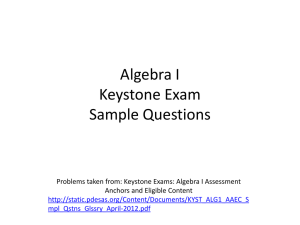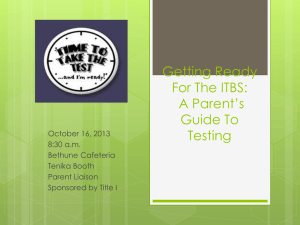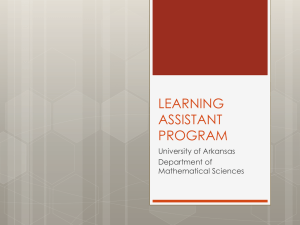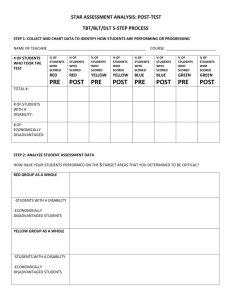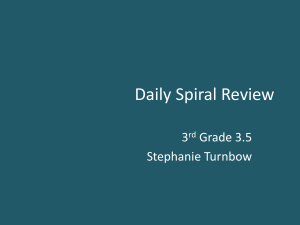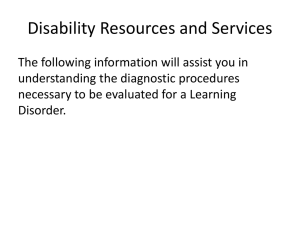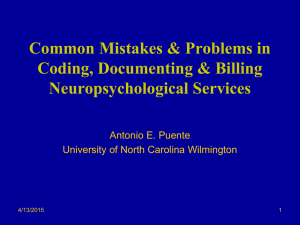Psychology 852 Cognitive and Neuropsychological Assessment Fall
advertisement
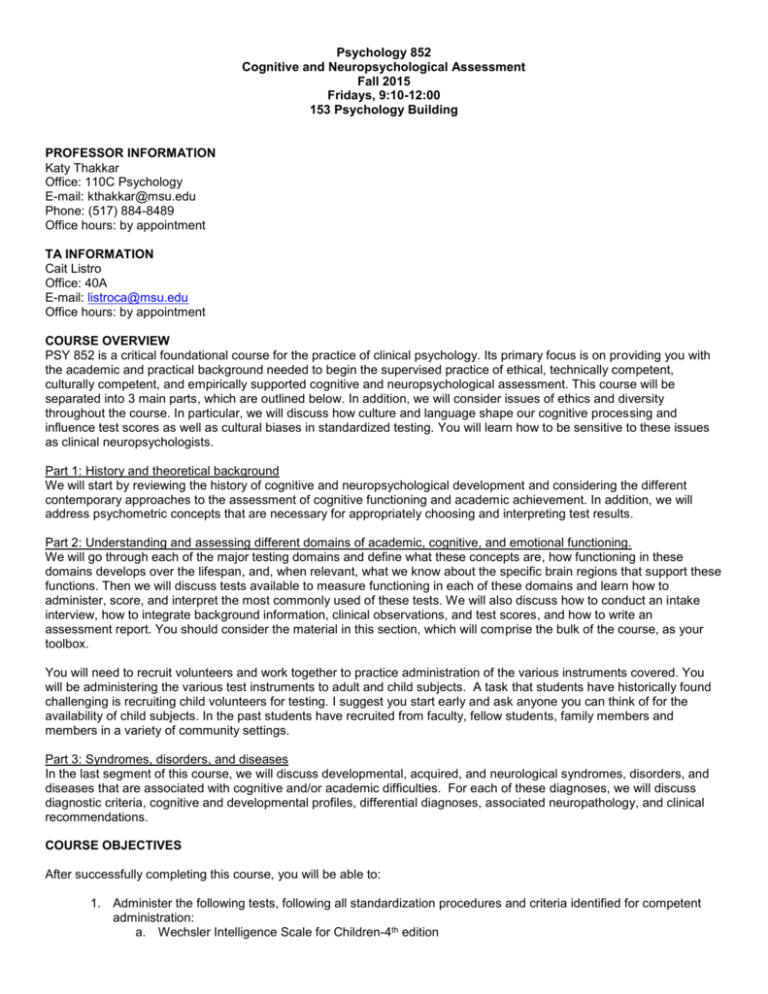
Psychology 852 Cognitive and Neuropsychological Assessment Fall 2015 Fridays, 9:10-12:00 153 Psychology Building PROFESSOR INFORMATION Katy Thakkar Office: 110C Psychology E-mail: kthakkar@msu.edu Phone: (517) 884-8489 Office hours: by appointment TA INFORMATION Cait Listro Office: 40A E-mail: listroca@msu.edu Office hours: by appointment COURSE OVERVIEW PSY 852 is a critical foundational course for the practice of clinical psychology. Its primary focus is on providing you with the academic and practical background needed to begin the supervised practice of ethical, technically competent, culturally competent, and empirically supported cognitive and neuropsychological assessment. This course will be separated into 3 main parts, which are outlined below. In addition, we will consider issues of ethics and diversity throughout the course. In particular, we will discuss how culture and language shape our cognitive processing and influence test scores as well as cultural biases in standardized testing. You will learn how to be sensitive to these issues as clinical neuropsychologists. Part 1: History and theoretical background We will start by reviewing the history of cognitive and neuropsychological development and considering the different contemporary approaches to the assessment of cognitive functioning and academic achievement. In addition, we will address psychometric concepts that are necessary for appropriately choosing and interpreting test results. Part 2: Understanding and assessing different domains of academic, cognitive, and emotional functioning. We will go through each of the major testing domains and define what these concepts are, how functioning in these domains develops over the lifespan, and, when relevant, what we know about the specific brain regions that support these functions. Then we will discuss tests available to measure functioning in each of these domains and learn how to administer, score, and interpret the most commonly used of these tests. We will also discuss how to conduct an intake interview, how to integrate background information, clinical observations, and test scores, and how to write an assessment report. You should consider the material in this section, which will comprise the bulk of the course, as your toolbox. You will need to recruit volunteers and work together to practice administration of the various instruments covered. You will be administering the various test instruments to adult and child subjects. A task that students have historically found challenging is recruiting child volunteers for testing. I suggest you start early and ask anyone you can think of for the availability of child subjects. In the past students have recruited from faculty, fellow students, family members and members in a variety of community settings. Part 3: Syndromes, disorders, and diseases In the last segment of this course, we will discuss developmental, acquired, and neurological syndromes, disorders, and diseases that are associated with cognitive and/or academic difficulties. For each of these diagnoses, we will discuss diagnostic criteria, cognitive and developmental profiles, differential diagnoses, associated neuropathology, and clinical recommendations. COURSE OBJECTIVES After successfully completing this course, you will be able to: 1. Administer the following tests, following all standardization procedures and criteria identified for competent administration: a. Wechsler Intelligence Scale for Children-4th edition b. c. d. e. f. Wechsler Adult Intelligence Scale-4th edition Woodcock Johnson Tests of Acheivement-3rd edition Wechsler Individual Achievement Test-3rd edition Delis Kaplan Tests of Executive Functions Wechsler Memory Scale 2. Apply your understanding of the science and practice of assessment to administer, score, interpret, and critique other measures of cognitive functioning, including: a. WPPSI-IV b. WRAT-4 c. WTAR d. WIAT-III e. Vineland Adaptive Behavior Scale f. CPT-II g. Wisconsin Card Sorting Test h. CVLT-II i. Rey-Osterrieth Compex Figure Task j. Boston Naming Test k. Finger Tapping l. Grooved Pegboard m. Rating Scales: Young Adult Behavior Checklist, Child Behavior Checklist, Conners 3, Beck Depression and Anxiety Inventories n. Personality measures: MMPI, PAI 3. Summarize behavioral observations from test administrations and integrate these with test findings. 4. Describe important considerations for best practices in conducting intellectual and neuropsychological assessments, including consideration of developmental, social, ethical, and legal issues, and diversity (from ethnic/racial, cultural, and socioeconomic backgrounds). 5. Understand the historical roots of intellectual and neuropsychological testing and their role in the profession of clinical psychology. 6. Understand test terminology, psychometric properties, development and standardization of tests, and appropriate use of cognitive ability measures. 7. Develop recommendations and interventions based on assessment findings. 8. Demonstrate effective communication in report writing. MATERIALS Equipment Clipboard Stopwatch (preferably with no sound) Required Texts Readings from the following books will be covered in this course. Each of these will be an important part of your own reference library, so I recommend you purchase these. All remaining books are optional purchases. 1. Sattler, J.M. (2008). Assessment of Children: Cognitive Foundations (5th edition). La Mesa, CA. Jerome M. Sattler, Publisher, Inc. 2. Lezak, M.D., Howieson, D.B, Bigler, E. D. & Tranel, D. (2012). Neuropsychological assessment (5th Ed). New York: Oxford University Press. 3. Sattler, J.M. & Ryan, J.J. (2009). Assessment with the WAIS-IV. La Mesa, CA. Jerome M. Sattler, Publisher, Inc. Optional Texts You will be asked to read from the following texts. These readings will be made available to you. Although they are not strictly required for this course, the first four will serve as great future assessment resources, depending on your area and level of interest. Note, the first two books will be required in later courses, so might be advantageous to just purchase them now. 1. Postal, K.S. & Armstrong, K. (2013) Feedback that Sticks: The Art of Effectively Communicating Neuropsychological Assessment Results. Oxford University Press: Oxford. 2. Pennington, B.F. (2009) Diagnosing Learning Disorders, Second Edition: A neuropsychological framework. Guilford Press: NY. 3. Grant, I. & Adams, K. (2009) Neuropsychological Assessment of Neuropsychiatric and Neuromedical Disorders. Oxford University Press: Oxford. 4. Semrud-Clikeman, M., & Ellison, P.A.T. (2009). Child neuropsychology: Assessment and interventions for neurodevelopmental disorders (2nd Ed). New York: Springer. 5. Banich, M. (2004) Cognitive Neuroscience and Neuropsychology (2nd Ed). Boston: Houghton Mifflin Company. ASSIGNMENTS AND EVALUATION Your grade for this course will be determined by your performance in the following domains: (1) performance in class discussions, which are based on assigned readings and material from previous classes; (2) practice test administration; (3) interpretation of test results; (4) report writing; and (5) test battery development. A total of 300 points is possible for this course. Attendance and Participation (75 points) Class attendance is extremely important. Because of the applied nature of the lectures, it will be difficult to catch up on missed material. When possible, please let the instructor know in advance if you anticipate missing a class. In lieu of written midterm and final exams, there will be questions posed at the beginning of each class about assigned readings and class material from previous weeks. Making a satisfactory contribution to at least one discussion point will earn you full points for that day. You can make up for missed points in future sessions. Practice test administration, scoring, interpretation, and report writing (170 points) You will complete several assignments designed to help you become proficient in administering and scoring several of the most frequently used cognitive and neuropsychological tests. You will sometimes videotape these evaluations for the purposes of review by and feedback from the instructor, TA, and peers. When you are serving as a volunteer for one of your classmates to practice the tests, please do not give your best performance. Rather, for the adult measures, try to respond as you imagine the average 30-year old high school graduate would respond. For the child measures, try and respond as if you are an 8-year-old typically developing child, for your gender and ethnicity, fully acclimated to mainstream US culture. Note that one of your assignments asks you to conduct an evaluation on a child volunteer. Please start early to find such a volunteer through friends, colleagues, community members, MSU faculty, etc. If you cannot find a volunteer, please contact me well before the evaluation must be completed, and I can try to help you out. Under no circumstances will the test scores be shared with parents or subject volunteers. All volunteers must sign, or have a parent sign, a written consent form. Consents forms must be attached to reports. Specific assignments are outlined below. (1) Administer the WAIS-IV to a classmate and score by hand. Please videotape the evaluation for the purposes of peer review and turn in the scored protocols during class. (5 points) (2) Administer the WISC-IV to a classmate and score by hand. Please videotape the evaluation for the purpose of review and turn in the scored protocols during class. (5 points) (3) Review the videotape of either the WAIS-IV (Assignment 1) or WISC-IV (Assignment 2) administration from one of your classmates. Use the checklist for general test administration practices checklist in the main Sattler text (WISC-IV) or supplemental (WAIS-IV) Sattler and Ryan text. Please turn in the completed checklist during class. (6 points) (4) Administer the WIAT-III to a classmate and score by hand or using the computer program. Please turn in the scored protocol during class. (10 points). (5) Administer the Woodcock-Johnson III Tests of Achievement to a classmate. Score by hand or using the computer program and please turn in the scored protocol during class. (4 points). (6) Child evaluation-Administer a WISC-IV and WJ-III Tests of Achievement to an age-appropriate volunteer and score (either by hand or with the computer). Please videotape this assessment and write a report that includes only the table of test scores, behavioral observations, results, and summary. You must have your pseudo-client complete the assent form provided and have the parent/guardian completed the consent form provided by the instructors. (60 points) (7) Administer the D-KEFS to a classmate and score by hand. Please turn in the scored protocol during class. (10 points) (8) Administer the WMS-III to a classmate and score by hand. Please turn in the scored protocol during class. (10 points) (9) Adult evaluation-Perform an intake evaluation and administer a cognitive test battery that includes WAIS-IV, WIAT-III, WMS-IV, D-KEFS, WMS-IV, BAI, and BDI. Please videotape this assessment and write a full report, excluding recommendations. Your volunteer likely does not have any presenting problems—in which case, you can make up a reason for assessment. You must get a signed release (provided by your instructor) for this practice assessment and for video recording from your practice pseudo-client. (60 points) Developing a test battery (15 points) The following assignment is designed to help you think about choosing an appropriate test battery given information provided by the referring provider and acquired during the intake interview. (10) You will be given a set of clinical vignettes describing a client’s reason for referral and relevant background and asked to devise a battery based on the presenting problems and history. Instructor observed test administration (40 points) (11) You must schedule a 30-minute block with me during finals week (December 14-18). During that time, you will be asked to administer 5 segments from any of the measures learned in class. You will be evaluated on the accuracy of the directions, as well as your administration and scoring. GRADING A total of 300 points is possible for this course. You must receive a 3.0 or higher to pass the course. 4.0 3.5 3.0 2.5 2.0 1.5 1.0 0.0 92-100% 84-91% 76-83% 71-75% 66-70% 61-65% 56-60% < 56% 276-300 points 252-275 points 228-251 points 213-227 points 198-212 points 183-197 points 168-182 points < 167 points ETHICAL ISSUES Confidentiality Although the individuals you will be testing are volunteers, rather than treatment-seeking clients, confidentiality is still very important. Do not record real names on any testing data. Instead, use some kind of anonymized code or pseudonym. Please do not share the results of testing with people other than your instructor or classmates, for the purposes of consultation. Test security It is very important to respect test security. Releasing the specific details of psychological tests to non-professionals compromises the validity of their use. ADMINISTRATIVE DETAILS Inclement weather Assume that if the University is open, we will have class Accommodation for persons with disabilities Students with disabilities that affect their ability to participate fully in class or meeting course requirements are encouraged to bring this to my attention as soon as possible. Given documentation of your disability from the Resource Center for Persons with Disabilities (https://www.rcpd.msu.edu/), I will happily work with you to make appropriate accommodations. I will attempt to maintain the confidentiality of such information to the best of my ability. Academic integrity The Department of Psychology adheres to the policies on academic honesty as specified in General Student Regulations 1.0, Protection of Scholarship and Grades; the university-wide policy of Integrity of Scholarship and Grades; and Ordinance 17.00, Examinations. For more information, see Spartan Life: Student Handbook and Resource Guide at http://splife.studentlife.msu.edu. Unless you are authorized by me, you are expected to complete all assignments without assistance from any source. Students who violate MSU rules may receive a penalty grade including but not limited to a failing grade on the assignment or in the course. Students are encouraged to reference the website prepared by the University Ombudsman at http://www.msu.edu/unit/ombud, especially the section on Academic Honesty. Observing religious holidays Students may make up coursework missed to observe a major religious holiday only if they make arrangements in advance with the instructor. Late assignments 15% will be deducted from your grade for late assignments, for each day they are late. Schedule of class meetings, topics, and assignments: Class Date 1 9/4/15 2 9/11/15 3 TBD Topic Introduction to assessment History of cognitive and neuropsychological assessment Theoretical orientations Essential psychometrics The assessment process Intake interviews Behavioral observations General testing guidelines Effort testing Intelligence: construct and historical context WAIS-IV -See reading list -See reading list -See reading list -Schedule WAIS-IV administration with classmate 9/25/15 WISC-IV Weschler interpretation Tests of premorbid and nonverbal intelligence (TONI and WTAR) -See reading list -Turn in scored WAIS-IV protocols -Schedule WISC-V administration with classmate 10/2/15 Ethical, professional and cultural issues Achievement WIAT-III -See reading list -Turn in scored WISC-V protocol -Schedule WIAT-III Tests of Achievement administration with classmate 10/9/15 WJ-III Adaptive functioning (Vineland Adaptive Behavior Scale) Syndromes: Intellectual disability and learning disorders -See reading list -Turn in scored WIAT-III Tests of Achievement protocol -Turn in administration practices checklist conducted during test observation -Schedule WJ-III administration with classmate 4 5 6 10/16/15 NO CLASS—will reschedule 10/23/15 -See reading list -Turn in scored WIAT-III protocol -Have child evaluation conducted and scored by this point -Schedule time with instructor/TA to give feedback on video sometime before 11/6 10/30/15 -See reading list -Turn in scored DKEFS protocol -Turn in child evaluation protocol, results+interpretation, and videos -Schedule time with instructor/TA to give feedback on administration and report before 11/13 -Schedule WMS-IV administration with classmate 7 Report writing and feedback Brief introduction to functional neuroanatomy Attention, Concentration, and working memory: construct, neuronal mechanisms, and tests 8 9 Assignment due on this date 11/6/15 Executive functioning: construct, neural mechanisms, and tests Language: construct, neural mechanisms, and tests 10 Memory: construct, neural mechanisms, and tests (WMS) 11/13/15 11 11/20/15 12 11/27/15 13 12/4/15 -See reading list Visuospatial abilities: construct, neural mechanisms, and tests Processing speed: construct, neural mechanisms and tests Sensorimotor/Psychomotor functioning: construct, neural mechanisms and tests Psychological/Emotional/Behavioral functioning Thanksgiving: no class Syndromes: ADHD, autism spectrum disorders, and other congenital/genetic conditions 14 12/11/15 15 -See reading list -Turn in scored WMS-IV protocol TBD Head injury, cortical dementias Seizures, stroke, other progressive CNS disorders, cancer -See reading list -Have adult evaluation conducted and scored by this point -Schedule time with instructor/TA to give feedback on administration and report before 12/11 -See reading list -Turn in full adult report, scored protocol, and video -See reading list -Turn in test battery development -Schedule time with instructor for test administration -See reading list Reading List (**Priority) 9/4/2015 **Lezak textbook, Chapter 1 **Sattler textbook, Chapters 2 (until page 38) & Chapter 4 **Meyer, G.J., Finn, S.E., Eyde, L.D., Kay, G.G., Moreland, K.L., Dies, R.R., Eisman, E.J., Kubiszyn, T.W., & Reed, G.M. (2001). Psychological testing and psychological assessment: A review of evidence and issues. American Psychologist, 56, 128-165. 9/11/2015 **Sattler textbook, Chapters 1 and 6, Chapter 2 (p. 38-end) Lezak Chapter 5 Lezak Chapter 20, pp. 830-836 9/18/2015 (this class date will be rescheduled) **Sattler textbook, Chapter 7 **Nisbett, R.E., Aronson, J., Blair, C., Dickens, W., Flynn, J., Halpern, D.F., Turkheimer, E. (2012) Intelligence: New findings and theoretical developments, 67: 130-159. **Sattler and Ryan, Chapters 2-3 (skim) Sattler textbook, Chaper 8 9/25/2015 **Sattler textbook, Chapters 9-10 Pick one of the following: **Sattler and Ryan, Chapter 4 (WAIS-IV interpretation) **Sattler, Ch. 11 (WISC-IV interpretation) 10/2/2015 **Sattler Ch. 3 **Sattler Ch. 5 10/9/2015 **Pennington book, Ch. 1,6,10, 13 Sattler resource guide, Appendix H (skim) Pennington book, Ch. 3, 5 10/23/2015 **Sattler Chapter 19 **Postal and Armstrong book, Chapters 1-4 10/30/2015 **Semrud-Clikeman textbook, Chapter 2 **Royall, D.R., Lauterbach, E.C., Cummings, J.L., Reeve, A., Rummans, T.A., Kaufer, D.I., LaFrance, W.C., Coffey, C.E. (2002) Executive Control Function: A Review of Its Promise and Challenges for Clinical Research. J Neuropsychiatry Clin Neurosci, 14: 377-405. 11/6/2015 Banich textbook, Chapter 9 11/13/2015 Banich textbook, Chapter 10 11/20/2015 **Sweet, J.J., Newman, P., Bell, B. (1992) Significance of depression in clinical neuropsychological assessment. Clinical Psychology Review, 12:21-45. 12/4/2015 **Pennington book, Ch. 8-9 12/11/2015 **Lezak Chapter 7, pp. 180-228 **Grant and Adams, Chapter 8 TBD (make up class from 10/16) **Grant and Adams, Ch. 12 Lezak Chapter 7 (pp. 249-304)
